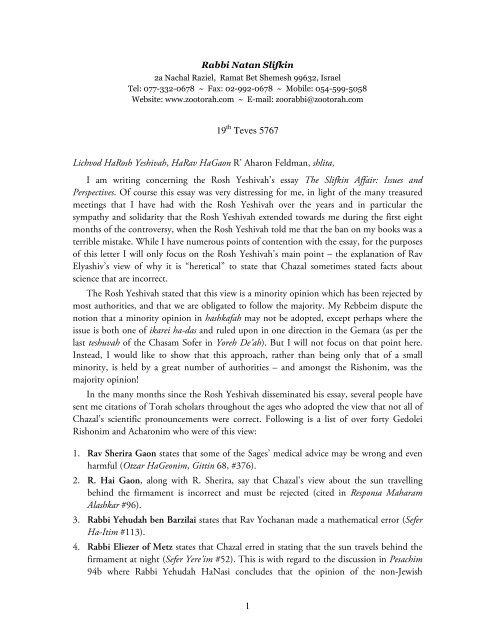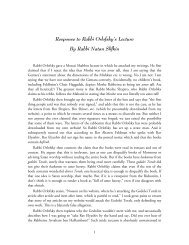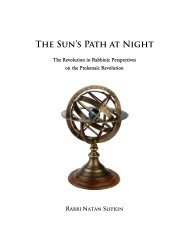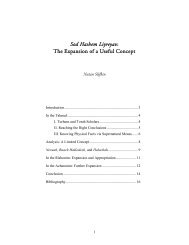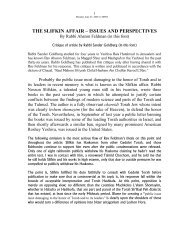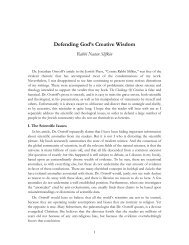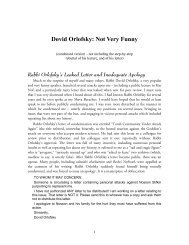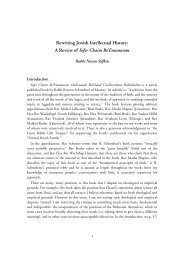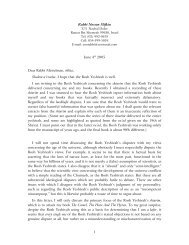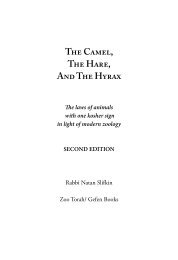Letter from Rabbi Natan Slifkin to Rav Aharon Feldman - Zoo Torah
Letter from Rabbi Natan Slifkin to Rav Aharon Feldman - Zoo Torah
Letter from Rabbi Natan Slifkin to Rav Aharon Feldman - Zoo Torah
You also want an ePaper? Increase the reach of your titles
YUMPU automatically turns print PDFs into web optimized ePapers that Google loves.
<strong>Rabbi</strong> <strong>Natan</strong> <strong>Slifkin</strong><br />
2a Nachal Raziel, Ramat Bet Shemesh 99632, Israel<br />
Tel: 077-332-0678 ~ Fax: 02-992-0678 ~ Mobile: 054-599-5058<br />
Website: www.zoo<strong>to</strong>rah.com ~ E-mail: zoorabbi@zoo<strong>to</strong>rah.com<br />
19 th Teves 5767<br />
Lichvod HaRosh Yeshivah, Ha<strong>Rav</strong> HaGaon R’ <strong>Aharon</strong> <strong>Feldman</strong>, shlita,<br />
I am writing concerning the Rosh Yeshivah’s essay The <strong>Slifkin</strong> Affair: Issues and<br />
Perspectives. Of course this essay was very distressing for me, in light of the many treasured<br />
meetings that I have had with the Rosh Yeshivah over the years and in particular the<br />
sympathy and solidarity that the Rosh Yeshivah extended <strong>to</strong>wards me during the first eight<br />
months of the controversy, when the Rosh Yeshivah <strong>to</strong>ld me that the ban on my books was a<br />
terrible mistake. While I have numerous points of contention with the essay, for the purposes<br />
of this letter I will only focus on the Rosh Yeshivah’s main point – the explanation of <strong>Rav</strong><br />
Elyashiv’s view of why it is “heretical” <strong>to</strong> state that Chazal sometimes stated facts about<br />
science that are incorrect.<br />
The Rosh Yeshivah stated that this view is a minority opinion which has been rejected by<br />
most authorities, and that we are obligated <strong>to</strong> follow the majority. My Rebbeim dispute the<br />
notion that a minority opinion in hashkafah may not be adopted, except perhaps where the<br />
issue is both one of ikarei ha-das and ruled upon in one direction in the Gemara (as per the<br />
last teshuvah of the Chasam Sofer in Yoreh De’ah). But I will not focus on that point here.<br />
Instead, I would like <strong>to</strong> show that this approach, rather than being only that of a small<br />
minority, is held by a great number of authorities – and amongst the Rishonim, was the<br />
majority opinion!<br />
In the many months since the Rosh Yeshivah disseminated his essay, several people have<br />
sent me citations of <strong>Torah</strong> scholars throughout the ages who adopted the view that not all of<br />
Chazal’s scientific pronouncements were correct. Following is a list of over forty Gedolei<br />
Rishonim and Acharonim who were of this view:<br />
1. <strong>Rav</strong> Sherira Gaon states that some of the Sages’ medical advice may be wrong and even<br />
harmful (Otzar HaGeonim, Gittin 68, #376).<br />
2. R. Hai Gaon, along with R. Sherira, say that Chazal’s view about the sun travelling<br />
behind the firmament is incorrect and must be rejected (cited in Responsa Maharam<br />
Alashkar #96).<br />
3. <strong>Rabbi</strong> Yehudah ben Barzilai states that <strong>Rav</strong> Yochanan made a mathematical error (Sefer<br />
Ha-Itim #113).<br />
4. <strong>Rabbi</strong> Eliezer of Metz states that Chazal erred in stating that the sun travels behind the<br />
firmament at night (Sefer Yere’im #52). This is with regard <strong>to</strong> the discussion in Pesachim<br />
94b where <strong>Rabbi</strong> Yehudah HaNasi concludes that the opinion of the non-Jewish<br />
1
scholars, that the sun travels behind the earth at night, was correct. While Maharal<br />
interprets this metaphorically, <strong>Rabbi</strong> Eliezer of Metz and countless other authorities take<br />
the Gemara at face value and explain that Chazal were mistaken; even Rabbeinu Tam,<br />
who claims that the Jewish scholars were actually correct and that the sun travels behind<br />
the sky at night, disputes the Maharal and takes the Gemara at face value.<br />
5. Rambam states that the Sages knowledge of astronomy was not based on tradition and<br />
was sometimes errant (Guide for the Perplexed 2:8 and 3:14).<br />
6. Tosefos Rid states that the Sages erred concerning where the sun goes at night (Tosefos<br />
Rid, Shabbos 34b, s.v. Eizehu) and expresses surprise that <strong>Rabbi</strong> Yochanan and the judges<br />
of Caesarea erred in a simple mathematical matter (but by implication it is not<br />
impossible <strong>to</strong> err in other scientific matters) (Commentary <strong>to</strong> Eruvin 76b).<br />
7. Rabbeinu Avraham ben HaRambam states that the statements of the Sages in medicine,<br />
science and astronomy were based on their own investigations and were sometimes<br />
incorrect. (I know that <strong>Rabbi</strong> Moshe Shapiro has repeatedly claimed that this is a<br />
fraudulent work that was falsely attributed <strong>to</strong> Rabbeinu Avraham by the maskilim.<br />
However the manuscript experts that I consulted dismissed this theory. Fragments of the<br />
original Arabic, dating probably <strong>from</strong> the 14th century, were discovered in the Cairo<br />
Geniza. The treatise has been printed in the Ein Yaakov for over 100 years without<br />
anyone challenging it as being heretical, and <strong>Rabbi</strong> Shlomo Zalman Auerbach accepted it<br />
as an authentic view.)<br />
8. Ramban presents the opinion of the Greek philosophers regarding conception as an<br />
alternative <strong>to</strong> that of the Sages (Commentary <strong>to</strong> Leviticus 12:2). He also suggests that the<br />
dispute between the Sages concerning terefos may be based on a scientific dispute – where<br />
one side would be correct and one incorrect (Chullin 42a).<br />
9. Tosafos states that <strong>Rabbi</strong> Yochanan and the Gemara in Sukkah erred in a simple<br />
mathematical matter (Eruvin 76b). (The Vilna Gaon is appalled at the idea that they<br />
could have erred in such a simple matter; but he does not deny that Tosafos is of this<br />
opinion.)<br />
10. Rashba states that <strong>Rabbi</strong> Yochanan and the judges of Caesarea erred in a mathematical<br />
matter (Commentary <strong>to</strong> Eruvin 76b).<br />
11. Rosh states that <strong>Rabbi</strong> Yochanan and the judges of Caesarea erred in a mathematical<br />
matter (Tosefos HaRosh, Eruvin 76b and Sukkah 8b). He also endorses the view of <strong>Rabbi</strong><br />
Eliezer of Metz that the Sages erred concerning where the sun goes at night (Pesachim<br />
2:30; She’eilos U’Teshuvos HaRosh, Kelal 14, #2).<br />
12. Sefer Mitzvos HaGadol endorses the view of <strong>Rabbi</strong> Eliezer of Metz that the Sages erred<br />
concerning where the sun goes at night (Lo Ta’aseh #79).<br />
13. Rabbeinu Manoach states that the Sages erred concerning where the sun goes at night<br />
(Commentary <strong>to</strong> Mishneh <strong>Torah</strong>, Hilchos Chametz U-Matzah 5:11, s.v. Ela bemayim<br />
shelanu).<br />
2
14. Meiri indicates that the Sages’ knowledge of human ana<strong>to</strong>my was inaccurate<br />
(Commentary <strong>to</strong> Niddah 17b).<br />
15. Ritva indicates that the Sages erred concerning where the sun goes at night<br />
(Commentary on the Haggadah, s.v. Matzah zo she’anu ochlim).<br />
16. Rabbeinu Bechaya ben Asher presents the opinion of scientists regarding conception as a<br />
legitimate alternative <strong>to</strong> that of the Sages (Commentary <strong>to</strong> Leviticus 12:2).<br />
17. Rabbeinu Yerucham ben Meshullam endorses the view of <strong>Rabbi</strong> Eliezer of Metz that the<br />
Sages erred concerning where the sun goes at night (Toldos Adam VeChavah, Nesiv V,<br />
Part 3).<br />
18. Ralbag states that Ezekiel received a mistaken scientific fact in one of his prophecies<br />
(Genesis 15:4, Beiur Divrei Hasipur, and Job 38:18-20, Beiurei Divrei Hama’aneh).<br />
19. Ran expresses surprise that <strong>Rabbi</strong> Yochanan erred in a simple mathematical matter<br />
(Eruvin 76b).<br />
20. <strong>Rabbi</strong> Yitzchak Arama states that the Sages erred concerning the motion of the stars<br />
(Akeidas Yitzchak, Parashas Bo 37).<br />
21. <strong>Rabbi</strong> Eliyahu Mizrachi states that the Sages had a scientific dispute with the non-Jews<br />
concerning where the sun goes at night and that <strong>Rabbi</strong> Yehudah HaNasi decided in favor<br />
of the gentile scholars (Responsum #57).<br />
22. Maharam Alashkar states that the Sages erred concerning where the sun goes at night<br />
(Responsum #96).<br />
23. <strong>Rabbi</strong> Shem Tov ben Yosef endorses Rambam’s view that the Sages erred in matters of<br />
astronomy (Shem Tov commentary <strong>to</strong> The Guide for the Perplexed 2:8:2)<br />
24. Radvaz states that the Sages erred concerning where the sun goes at night (She’eilos<br />
Uteshuvos Radvaz, Part IV, #282).<br />
25. Lechem Mishneh states that the Sages erred concerning where the sun goes at night<br />
(Lechem Mishneh <strong>to</strong> Mishneh <strong>Torah</strong>, Hilchos Shabbos 5:4).<br />
26. Maharsha states that the Sages had a dispute concerning rainfall which is <strong>to</strong> be<br />
unders<strong>to</strong>od literally as a scientific dispute (and hence one side is wrong) (Ta’anis 9b).<br />
27. Minchas Kohen states that the Sages erred concerning where the sun goes at night (Sefer<br />
Mevo Hashemesh 10).<br />
28. <strong>Rabbi</strong> Yosef Shlomo Delmedigo states that the Sages erred in various matters of<br />
astronomy (Elim, Ma’ayan Chastum #67).<br />
29. <strong>Rabbi</strong> Yisrael Friedman of Ruzhin says that because the gentiles dedicated themselves <strong>to</strong><br />
lower forms of wisdom such as the natural sciences, they were able <strong>to</strong> attain greater<br />
proficiency in them than Chazal, who dedicate themselves <strong>to</strong> higher forms of wisdom<br />
(Cited by <strong>Rabbi</strong> Menachem Nachum Friedman in Maseches Avos Im Perush Man, p. 8).<br />
30. <strong>Rabbi</strong> Binyamin Mussafia states that the Sages erred regarding their belief in the<br />
salamander being generated in fire and living in it (Mussaf Ha-Aruch, erech Salamandra).<br />
3
31. Chavos Ya’ir states that the Sages erred in various matters of astronomy and endorses<br />
Rambam’s view on this matter (She’eilos UTeshuvos Chavos Ya’ir #210).<br />
32. Pri Chadash states that <strong>Rabbi</strong> Dosa, whose view was adopted in the Shulchan Aruch,<br />
erred in a zoological matter concerning whether a non-kosher animal can have horns (Pri<br />
Chadash, Yoreh De’ah 80:2).<br />
33. <strong>Rabbi</strong> Yitzchak Lampronti suggests that the Sages may have been mistaken about lice<br />
spontaneously generating, just as they were mistaken about where the sun goes at night<br />
(Pachad Yitzchak, erech tzeidah). (Note that even his teacher <strong>Rav</strong> Brill, who disagrees with<br />
him, admits that the Sages themselves thought themselves mistaken in their dispute with<br />
the non-Jewish scholars.)<br />
34. <strong>Rabbi</strong> Aviad Sar-Shalom Basilea states that “one does not compromise his faith in the<br />
least by disagreeing with a given statement of Chazal as long as it is clear that Chazal<br />
based that statement not on received tradition but on their own reasoning” (Sefer Emunas<br />
Chachamim, Chap. 5) – he adds that if Chazal were unanimous on something then they<br />
must have been correct due <strong>to</strong> their superior intellect, which would presumably not apply<br />
<strong>to</strong> scientific data that was received <strong>from</strong> the empirical investigations of others.<br />
35. Korban Nesanel states that <strong>Rabbi</strong> Yochanan and the judges of Caesarea erred in a<br />
mathematical matter (Eruvin 76b).<br />
36. <strong>Rabbi</strong> Samson Raphael Hirsch states that the Sages relied on the scientific knowledge of<br />
their era which was sometimes mistaken (<strong>Letter</strong> <strong>to</strong> <strong>Rabbi</strong> Hile Wechsler). (I know that<br />
<strong>Rav</strong> Moshe Shapiro shlita has repeatedly claimed that this letter is not <strong>from</strong> <strong>Rav</strong> Hirsch,<br />
and his disciple’s work Afikei Mayim claims that it is merely a collection of Azariyah de<br />
Rossi’s ideas, but there is irrefutable evidence that it is <strong>from</strong> <strong>Rav</strong> Hirsch – we have <strong>Rabbi</strong><br />
Wechsler’s original letters <strong>to</strong> <strong>Rav</strong> Hirsch containing his questions and reactions <strong>to</strong> the<br />
letters.)<br />
37. Maharam Schick states that certain matters in the Talmud were not part of the Sinaitic<br />
tradition but rather were assessments that are potentially errant (Responsum #7).<br />
38. <strong>Rabbi</strong> Dovid Friedmann (Karliner) states that the Sages’ knowledge of many scientific<br />
things did not stem <strong>from</strong> Sinaitic tradition but rather <strong>from</strong> their own knowledge and<br />
things that they learned <strong>from</strong> non-Jews (letter quoted in <strong>Rabbi</strong> Moshe Pirutinsky, Sefer<br />
Habris 264:7:11).<br />
39. Ben Ish Chai says that Chazal’s statements about astronomy were based on their own<br />
speculation and were in error (Benayahu, Bava Batra 25b)<br />
40. <strong>Rabbi</strong> Yitzchak Herzog states that he adopts the position of Rabbeinu Avraham ben<br />
HaRambam that the Sages were not infallible in their pronouncements about science<br />
(Judaism: Law & Ethics, p. 152).<br />
41. <strong>Rabbi</strong> Eliyahu Dessler states that the Sages sometimes gave mistaken explanations of<br />
halachos that were based on the scientific knowledge of their time (Michtav Me-Eliyahu<br />
IV p. 355).<br />
4
Even if a few of these sources can be interpreted differently, most will remain. And there<br />
are many further sources which strongly indicate this approach, albeit not as explicitly as in<br />
the above sources. In addition, this list does not include recent authorities of our time who<br />
adopted or legitimized this approach, such as <strong>Rav</strong> Shlomo Zalman Auerbach (who rated its<br />
application regarding medicine as a legitimate viewpoint that is clearly not beyond the pale,<br />
albeit a minority view that is not used for halachic purposes), <strong>Rav</strong> Aryeh Carmell, and <strong>Rav</strong><br />
Shaul Yisraeli. Nor does it include current authorities who legitimize it, such as <strong>Rav</strong> Shlomo<br />
Fisher, <strong>Rav</strong> Zalman Nechemiah Goldberg, <strong>Rav</strong> Herschel Schachter, and <strong>Rav</strong> Shmuel<br />
Kamenetzky. Furthermore, all the later authorities I have cited, both in this paragraph and in<br />
the above list, were clearly not of the opinion that it was forbidden <strong>to</strong> adopt this approach.<br />
Either they disagreed that one must follow the majority view in this matter, or they disagreed<br />
that the majority view was that this position was wrong.<br />
I am aware of only a small number of authorities who maintained that Chazal were<br />
infallible in all their pronouncements. Several authorities commonly cited as maintaining this<br />
view, such as Rashba and Maharam Alashkar, clearly did not do so, for they are in the list<br />
above as attesting in some cases <strong>to</strong> scientific errors in the Gemara. The statements by these<br />
authorities which seem <strong>to</strong> attest <strong>to</strong> the infallibility of Chazal may well be polemical<br />
statements, generalities that do not address rare scientific errors, or statements that were<br />
limited <strong>to</strong> particular cases such as terefos about which Chazal received their information <strong>from</strong><br />
Sinai. The fact that authorities used the approach of nishtaneh hateva does not mean that<br />
they considered Rambam’s approach <strong>to</strong> be wrong and certainly not beyond the pale.<br />
In light of all the above, would it not be inaccurate <strong>to</strong> prohibit this approach as being the<br />
minority view? Is it not reasonable <strong>to</strong> conclude that at the very least there is a well-founded<br />
approach that has been in use for many hundreds of years, and that those whose Rebbeim<br />
continue in this tradition and endorse this view should be regarded as yera’im u-shlaimim?<br />
Respectfully,<br />
<strong>Natan</strong> <strong>Slifkin</strong><br />
P.S. In the Rosh Yeshivah’s essay, it was stated that a future essay would provide cogent<br />
alternative answers <strong>to</strong> the three cases in my book where I quoted authorities who stated that<br />
Chazal relied on the mistaken science of their day – the account of the spontaneous<br />
generation of lice <strong>from</strong> sweat (with which the Gemara says that there is no such thing as lice<br />
eggs), where I quoted <strong>Rav</strong> Lampronti and <strong>Rav</strong> Dessler; the account of salamanders growing<br />
in fire, where I quoted <strong>Rav</strong> Binyomin Musafia; and the account of the spontaneous<br />
generation of mice <strong>from</strong> dirt, where I quoted <strong>Rav</strong> Hirsch. I and many others sincerely await<br />
seeing and studying these alternative explanations.<br />
5


